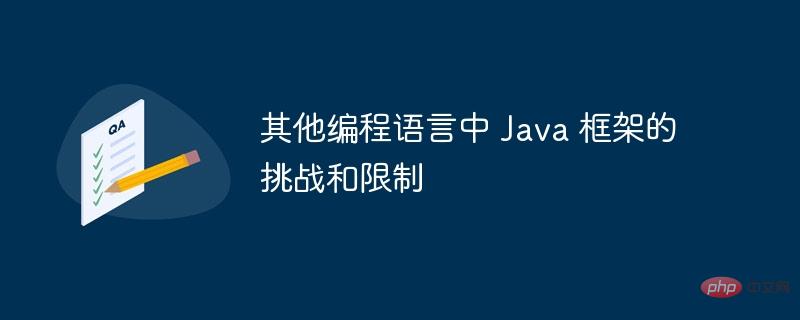Home >Java >javaTutorial >Challenges and limitations of Java frameworks in other programming languages
Challenges and limitations of Java frameworks in other programming languages
- WBOYWBOYWBOYWBOYWBOYWBOYWBOYWBOYWBOYWBOYWBOYWBOYWBOriginal
- 2024-06-05 15:34:271161browse
Using Java frameworks in other programming languages faces challenges such as type incompatibility, object model differences, dependency management, and performance overhead. Specifically, when using Spring in Python, type incompatibilities can be resolved using JPype, object model differences can be resolved using data class converters, and dependency management can be resolved using Maven or Gradle.

Challenges and limitations of using Java frameworks in other programming languages
Integrate Java frameworks when developing with them Moving to other programming languages brings some challenges and limitations. This article explores these challenges and provides practical examples to address them.
Challenges
- Type Incompatibility: There may be different type systems between the Java framework and the target language, resulting in a type mismatch and conversion issues.
- Object model differences: The object model in the Java framework may differ from the object model used in the target language, causing compatibility issues and conversion overhead.
- Dependency Management: Java frameworks often depend on other Java libraries that may not be compatible with the target language.
- Performance Overhead: Integrating Java frameworks into other programming languages may introduce additional performance overhead, especially for memory management and object conversion.
Limitations
- Limitations of language features:The syntax and semantics of the target language may limit or hinder certain aspects of the Java framework. some characteristics.
- Platform Availability: Not all Java frameworks are available on all programming language platforms, which may limit choices.
Practical case: Using Spring in Python
Consider the following practical case: Using the Spring framework in Python.
Challenge: Type Incompatibility
Python is a dynamically typed language, while Java is a statically typed language. To resolve type incompatibilities, you can use the JPype library to integrate the Java Virtual Machine into Python.
Solution:
import jpype
jpype.startJVM()
# 创建 Spring 应用程序上下文
application_context = jpype.JClass('org.springframework.context.support.ClassPathXmlApplicationContext')('beans.xml')Challenge: Object Model Difference
Spring framework uses a POJO-based model, while Python uses data class. To convert the object model, you can use data class converters.
Solution:
from springbeans.factory import BeanFactory
from dataclasses import dataclass, field
@dataclass
class Person:
name: str
age: int
# 转换器函数
def convert_person(java_person):
bean = BeanFactory.getBean(java_person.getClass().getName())
return Person(bean.getName(), bean.getAge())Challenge: Dependency Management
Spring framework depends on other Java libraries, such aslog4j. To manage dependencies, you can use Maven or Gradle to build a Python package that contains all required dependencies.
Solution:
[dependencies] jpype-jpackage = '1.0.2' jpype1-pycryptodome = '0.6.5'
Conclusion
Integrating Java frameworks in other programming languages is not without challenges and limitations. By resolving type incompatibilities, object model differences, and dependency management issues, they can be successfully integrated in real-world use cases.
The above is the detailed content of Challenges and limitations of Java frameworks in other programming languages. For more information, please follow other related articles on the PHP Chinese website!

